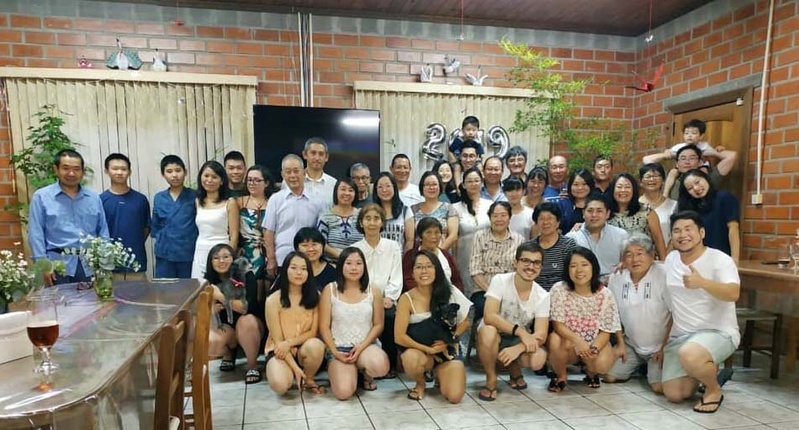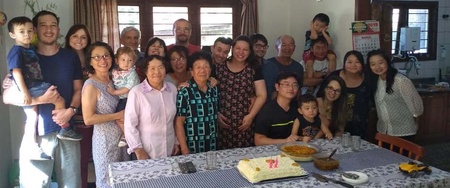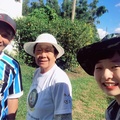My parents who struggled to raise me in Japan
However, my parents have worked harder than I could have ever imagined, and they raised my sister and I well in a country where we barely spoke the language. My mother never hid the fact that she was Brazilian. She took on the role of PTA officer at elementary and junior high school, something even Japanese people dislike, and completed the task.
My mother always said at parent-teacher meetings, "I'm Brazilian. I can't read or write that well, but I'll do whatever I can to help." So the mothers who knew my mother always said, "Ayori-chan's mother is really wonderful."
My father is also a hard worker, never complaining about anything, and always available to help me when I was in trouble. My father is a very hard worker, and has nearly 10 electrical qualifications. This year, he obtained the electrician's qualification, which is difficult even for Japanese people to obtain. It took about four years to obtain this qualification, and every year during the test period, he studied hard, carrying a book full of difficult terms and kanji, and this year he finally passed the second technical exam.
My parents are Brazilian, true Brazilians, and I am incredibly proud of them.
I am also proud of my grandparents who raised such parents. I have been living with my grandmother for the past year, and I have had the opportunity to hear a lot about how she came to Brazil and how she lived her life.
My grandmother immigrated to Brazil at the age of 20. She said that she had a lot of hardships before coming to Colonia Iboti. She said that there was a time when it was difficult to feed her children because her patrons did not pay her. And after coming to Colonia, she told me that she cultivated the undeveloped land from scratch to grow grapes and vegetables.
Why did he decide to reveal his Brazilian name?
My research subject at university was the historical background of immigration to Brazil, and the hardships faced by the first generation of immigrants before and after the war, as well as subsequent generations. Listening to my grandmother's actual experiences helped me to gain a deeper understanding.
The reason I chose this theme was to explore how I should live my life as a third generation Japanese immigrant. Until I became a university student, I registered my name at school as "Hayashi Ayori". However, after I became a university student, I decided to publicly announce myself as "Hayashi Geobana Ayori".
The reason was that I wanted to prove that I was me. While I was living as "Hayashi Ayori", somewhere in my heart I was hiding the fact that I was Brazilian.
However, in order to find out what my roots are and how I should live my life, I decided to start using another name. I actually used this name when I was looking for a job and during my teaching practice, but somewhere in my heart, I always felt like something was missing.
I now know the answer. It was because, even though I was Brazilian, I didn't know anything about Brazil, I couldn't become either Japanese or Brazilian, and I couldn't find out who I was.
Find your place
I didn't know who I was, so there was no way I could have imagined what kind of work I would do or how I would live my life.
However, when I actually had the opportunity to come to Brazil, I learned about the hardships that the Issei (my grandmother's generation) and Nisei (my parents' generation) had endured and how they contributed to the formation of today's Japanese community, and I realized that I exist as a descendant of people who had lived far more dramatic lives than the information I had read in books in Japan.
I have lived in Colonia Iboti for the past year, seeing with my own eyes the position of Japanese Brazilians in Brazilian society, talking to many first and second generation Japanese, and interacting with third generation children like me. I feel like I have found a little bit of my own way in life.
I grew up in Japan and consider myself to be Japanese.
But at the same time, I am Brazilian. Japan, my grandparents' home country, and Brazil, my parents' home country. I learned that both countries are my home countries, and that I belong in both countries.
If I hadn't been born in Brazil, if I hadn't gone to Japan at a young age, if I had only had a Brazilian or Japanese identity, I don't think I would have developed this way of thinking.
Because I was born a Brazilian of Japanese descent, I want to do what I can to improve both countries in my own way.
I am filled with gratitude to my parents, who gave me the opportunity to study in Brazil, to my grandmother, uncle and other family members who supported my life in Brazil, and to everyone I met in this country. Thank you.
*This article is reprinted from the Nikkei Shimbun (March 15, 2019).
© 2019 Geovana Ayori Hayashi





